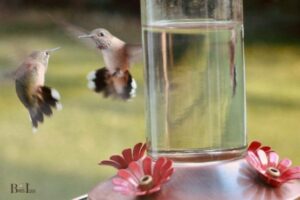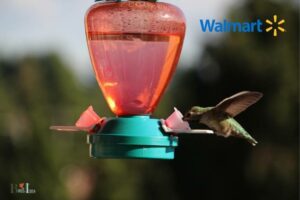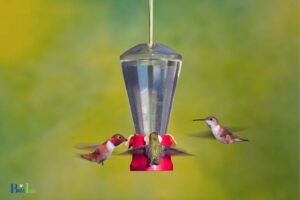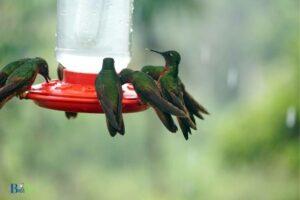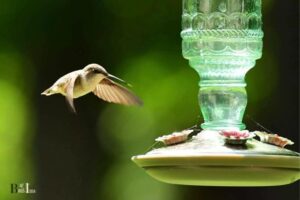How to Remove Rust from Hummingbird Feeder: A Guide!
To remove rust from a hummingbird feeder, you will need to soak the feeder in a rust-removing solution, scrub with a soft brush, and rinse thoroughly before refilling with nectar.
Rust can accumulate on the metal parts of a hummingbird feeder over time due to exposure to water and air. This can be harmful to hummingbirds and also make the feeder less attractive.
Removing the rust is essential to ensure the health of the hummingbirds and prolong the life of the feeder.
Soaking the feeder in a rust-removing solution, such as white vinegar or a commercial rust remover, helps to loosen the rust and makes it easier to remove. Ensure to dilute the solution if required according to the manufacturer’s instructions.
After soaking, use a soft brush to scrub away the rust without causing damage to the feeder. Finally, rinse the feeder thoroughly to remove any residue from the rust-removing solution, ensuring that it is safe for the hummingbirds before refilling it with fresh nectar.
5 Methods to Remove Rust from Hummingbird Feeder:
| Method | Tools/Supplies Needed | Steps |
| Soaking in White Vinegar | – White vinega | 1. Mix equal parts water and white vinegar in a container. 2. Place the rusted feeder parts in the solution. 3. Let it soak for at least 30 minutes |
| Baking Soda and Water | – Baking soda | 1. Mix baking soda and water to form a thick paste. 2. Apply the paste to the rusted areas of the feeder. 3. Let it sit for 15-20 minutes. |
| Lemon and Salt | – Lemon | 1. Cut a lemon in half and sprinkle salt on the rusted area. 2. Rub the cut side of the lemon over the salted rusted area. 3. Let it sit for 10-15 minutes. |
| Citric Acid | – Citric acid | 1. Fill a container with hot water. 2. Add enough citric acid to make a 5-10% solution. 3. Wear gloves and put the rusted feeder parts in the container. |
| Fine Steel Wool | – Fine steel wool | 1. Wet the rusted area with soapy water. 2. Gently rub the rusted area with the fine steel wool. 3. Frequently rinse the area to remove any rust particles. |
Key Takeaway
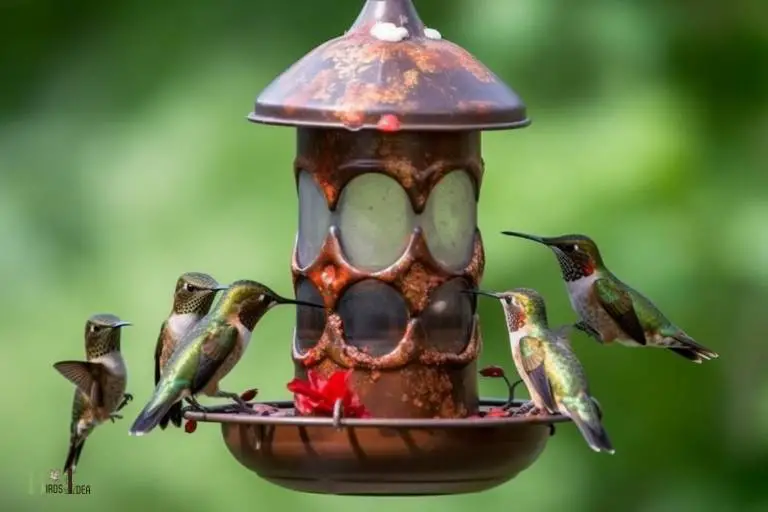
Five Facts About: How to Remove Rust from Hummingbird Feeder
Understanding Rust Formation On Your Hummingbird Feeder
The Science Behind Rust Formation On Bird Feeders
Hummingbird feeders are made of different metal materials that can rust over time. Rust is a result of the chemical reaction between metal, oxygen, and water.
When metal interacts with water and oxygen, it creates rust, which breaks down the metal’s surface and appearance.
The main cause of rust formation on hummingbird feeders is moisture build-up from the nectar which attracts the hummingbirds. Moisture promotes oxidation, which means the chance of rust formation increases.
It is essential to identify areas where rust is forming to prevent the rust from spreading and ruining your feeder.
Identifying Problem Areas On Your Hummingbird Feeder
Identifying rust on your hummingbird feeder can be an easy task with a few simple techniques.
Here are some simple steps to do so:
- Inspect the feeder: Look for brown, orange, or red powder-like substances on metal surfaces, including the feeder’s base, lid, and ports.
- Check the ports and perches: Check the metal ports where the hummingbirds feed from, as this is a common area for rust to accumulate.
There are a few more things to consider to prevent rust formation in the first place.
Here are some tips to avoid rust formation:
- Replace your feeder every few seasons: Replacement of old feeders is necessary to prevent any bacterial buildup as well as rust formation.
- Use distilled water: To proactively prevent rusts on your hummingbird feeder, use distilled water.
- Clean it regularly: Cleaning hummingbird feeders regularly will remove all traces of nectar in its cracks and crevices that can generate rust formation.
By understanding the science behind rust formation and identifying problem areas on your hummingbird feeder, you can prevent and remove rust formations from your feeder and keep the hummingbirds happily feeding.
Cleaning Rust From Your Hummingbird Feeder
Hummingbirds are some of the most fascinating birds to watch with their bright colors and quick movements. However, rust can quickly accumulate in hummingbird feeders and stubbornly stick to the surface.
This rust can contaminate the nectar and affect the health of the birds.
Fortunately, with the right tools and procedures, you can easily remove rust from your hummingbird feeder.
Tools And Materials Required For Rust Removal
Before you can start removing rust from your hummingbird feeder, you need to prepare the right tools and materials.
Here’s what you need:
- Rubber gloves
- Plastic or vinyl brush
- White vinegar or lemon juice
- Baking soda
- Warm water
- Soft cloth or towel
Steps For Complete Rust Removal
Now that you have everything you need, follow these steps to remove rust from your hummingbird feeder:
- Take apart the hummingbird feeder: Carefully remove the feeder and separate all its parts.
- Wear gloves: Protect your hands from the cleaning solution by wearing rubber gloves.
- Create a cleaning solution: Mix white vinegar or lemon juice with baking soda and create a paste-like solution.
By following these simple steps, you can successfully remove rust from your hummingbird feeder. Remember to clean the feeder regularly and to use high-quality materials to ensure the health and safety of your feathered friends.
How To Prevent Rust Formation On Your Hummingbird Feeder
Removing rust from a hummingbird feeder can be a frustrating task. However, prevention is always better than cure. If you take a few simple precautions, you can prevent rust formation on your hummingbird feeder.
So here are some tips that you can follow to keep your hummingbird feeder rust-free:
Choosing The Right Material For Your Feeder
When purchasing a hummingbird feeder, you need to select the right material to prevent rust formation. Some materials are better suited for humid, rainy climates and are less susceptible to rust than others.
Here are some of the best materials to look for:
- Glass: Glass hummingbird feeders are a great option as they are non-toxic, durable, and easy to clean. They are also resistant to rust and don’t absorb any odors or flavors.
- Stainless steel: Stainless steel is abrasive resistant and highly durable as it’s made up of a mixture of steel, nickel, and chromium. It’s a rust-resistant material, so it’s a great option for hummingbird feeders that last longer.
- Ceramic: Ceramic hummingbird feeders are sturdy and reliable. However, they can be a bit complicated to clean, but they are rust-free.
Proper Maintenance Tips
In addition to selecting the right material, proper maintenance can help prevent rust formation on your hummingbird feeder.
Here are some tips to follow:
- Clean regularly: Washing your hummingbird feeder regularly can help keep rust at bay. Clean it once every two days. Otherwise, you may end up with moldy sugar water that attracts hummingbirds that could make them ill.
- Dry the feeder after washing: Be sure to dry your hummingbird feeder thoroughly after cleaning it. Moisture is one of the leading causes of rust formation.
- Store it indoors: Storing your hummingbird feeder indoors during the offseason can also help prevent rust. Humidity is the enemy of most metals, so keeping your feeder dry and sheltered can go a long way to extend the life of your hummingbird feeder.
Preventing rust formation on your hummingbird feeder is key to its longevity and ensuring that your little friends have a clean, safe place to feed.
By choosing the right material and implementing proper maintenance techniques, you can keep rust at bay and enjoy watching your little feathered friends thrive.
Additional Tips For Hummingbird Care And Feeding
Ensuring Proper Hygiene Of Your Feeder
The proper hygiene of your feeder is crucial for the health of the hummingbirds.
Here are the tips to ensure the proper hygiene of your hummingbird feeder:
- Clean your hummingbird feeder once a week with hot water and mild soap.
- Rinse it thoroughly before refilling.
- Use a bottle brush to clean the hard-to-reach spots.
- Soak the feeder in a solution of one part vinegar to four parts water for an hour once a month.
- If there is any buildup of mold or mildew, soak it in a bleach solution of one teaspoon bleach per cup of water for an hour.
Homemade Nectar For Your Hummingbirds
Making homemade nectar for your hummingbirds is easy and cost-effective.
Here are some tips for making homemade nectar for your hummingbirds:
- Mix 1-part white granulated sugar with 4-parts water in a pot.
- Bring the mixture to a boil, stirring occasionally, until the sugar is dissolved.
- Boil the mixture for 1-2 minutes and then remove it from the heat.
- Allow the nectar to cool completely before filling the feeder.
- Do not use honey or artificial sweeteners.
By following these additional tips for hummingbird care and feeding, you can ensure that your feeder is clean and the nectar is fresh, which will attract more hummingbirds.
FAQ On How To Remove Rust From Hummingbird Feeder
How Can Rust Be Removed From A Hummingbird Feeder?
Can Rust Be Harmful To Hummingbirds?
How Often Should Hummingbird Feeders Be Cleaned?
What Is The Best Way To Prevent Rust In Feeders?
Conclusion
Now, you have all the essential information to clean rust from your hummingbird feeder. Remember, rust not only ruins the feeder’s appearance but also prevents birds from feeding.
By following these simple steps, you can prolong the lifespan of your hummingbird feeder and keep the birds coming back.
Regular cleaning and prevention measures can help eliminate rust and stop it from coming back. You can use several natural and commercial rust removers, but tsp and white vinegar are considered the best. Don’t forget to rinse the feeder with water to remove any traces of rust remover.
Afterward, fill the feeder with fresh food and enjoy watching your feathered friends visit your garden. Keep your hummingbird feeder rust-free with regular cleaning and maintenance.

